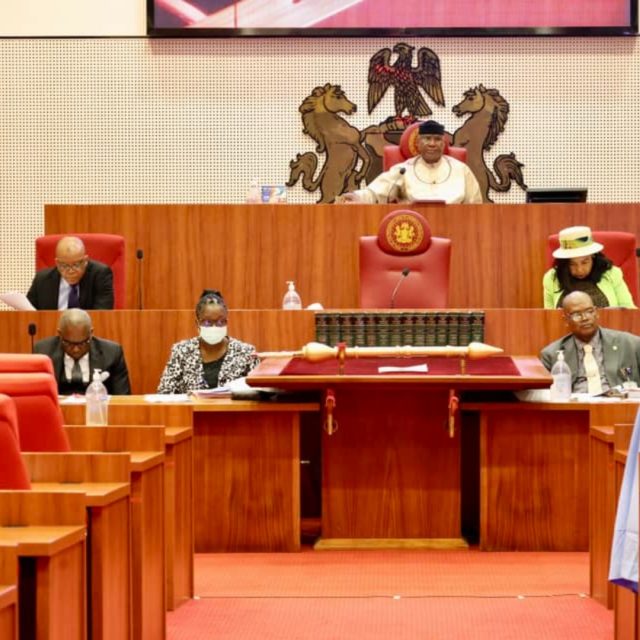Senate pledges support for the CBN in its continuous implementation of transformational payments and financial industry initiatives, resolves to embark on aggressive oversight of the apex bank during implementation of policy on Cash Withdrawal Limit

The Senate has demanded that the Central Bank of Nigeria considerably adjust its announced cash withdrawal limits in response to the public outcry against the new policy.
Nigeria’s apex bank has recently announced a policy limiting cash withdrawal by any individual to N100,000 weekly and Corporate bodies to N500,000 per week effective January 9, 2023, raising concerns across the country.
At Wednesday’s plenary, Senators who kicked against its timing, noted that Nigeria was not ripe for such, as rural dwellers would suffer, describing it as nonsensical, vague, nebulous and anti-people. They also warned that it might lead to a mass revolt across the country’s rural areas.
As part of its resolutions, the legislative chamber asked its Committee on Banking, Insurance and other Financial Institutions to embark on aggressive oversight of the apex bank as it implements the policy and give periodic reports to the Senate.
The Senate, however, supported the CBN in the continuous implementation of transformational payments and financial industry initiatives in line with its mandate in accordance with the CBN Act.
In his presentation of the report, Committee Chairman, Senator Uba Sani (APC, Kaduna Central), argued that the CBN well conceived the planned Cash Withdrawal Limit policy for transformation of the country’s economy and that the action falls within its mandate as provided for in Section 2(d) and 47 of its extant Act.
According to him, implementing the ‘Cashless policy’ in 6 states resulted in a reduction in the cost of currency management by 15.20% from N36 97 billion to N31.35 billion between 2013 and 2014. The trend, however, reversed in 2014 following the suspension of cash deposit charges in the six states leading currency, handling costs to increase by 17.20% between 2014 and 2015.
“The cost of currency management has been on the increase since then; total cost of currency management for ten months to the end of October 2022 was N47.25 billion,” Senator Sani argued.
Supporting the policy, Senator Degi Biobarakuma (PDP, Bayelsa East) urged Nigerians to support the implementation of this policy because of the gains it presented.
“I will like to commend the Committee for a detailed and extensive report that they have presented. Nigeria is part of the global financial system and from the report, we have been told that Nigeria is a leader in real time payment and we must be making progress. We must continue in the implementation of this policy because of the gains that we all know. This is the only way to go and it is the global practice.”
READ ALSO: Senate postpones debate on CBN’s Withdrawal Limit Policy
During the debate on the report and recommendations, Senator Ajibola Basiru (APC, Osun Central) noted that the proposed threshold of N100,000 and N500, 000 withdrawal per week for individuals and corporate bodies, respectively, was unrealistic.
According to him, “Laws are made for people and not people made or created for law. If CBN is acting under Sections 2(d) and 47 of its extant Act to make life difficult for Nigerians through a policy, as representatives of the people, we need to intervene.”
For Senator Adamu Aliero (PDP, Kebbi), “This report gives us an ideal picture of what the country should be but in reality, what is happening is different. The informal sector of the economy is very big and it is not captured in the banking system. More people in the rural areas don’t go to the bank and there is need for sensitization and enlightenment in order to make this kind of people embrace the banking system.
We have 774 Local Governments and only about 60% of these Local Government Areas are covered by the bank. It is difficult to really force these people to embrace banking culture. I support the idea of cashless policy but we should do it with caution.”
READ ALSO: Naira Redesign: “Policy designed to distract Stamp Duty Probe” – Rep Kazaure
Other lawmakers who spoke against the policy questioned the absence of consultations and timing of the policy.
“When this issue came out, everyone that spoke on that day agreed on what the CBN was about to do. However, we were skeptical of certain issues contained in the proposal. The details were not clear to any of us. If there had been consultation, we won’t be where we are today. People would have gotten to know what is required of them and what is required of the CBN.
The CBN approved POS operators and registered them and took money from them and now those people can only do so little. It took all our unemployed graduates off the street. This policy will send them back to the streets. Why is this happening during an election period? Why is it that it is coming now? There is a need to be flexible in what we are doing now,” former Minority Leader, Senator Biodun Olujimi noted.
On the part of Senator Stella Oduah, the policy appears punitive, stressing that the issue isn’t really about opposition to a cashless society.
“I don’t think that anybody objects to the fact that cashless society is what we need. My concern comes a as a result of us being punitive. We must ensure that our society progresses and those who make efforts to make additional living should be encouraged. When you look at the measures CBN has put in their policy, to me it appears punitive. I think in the global best practice it doesn’t exist so we don’t deter people from progressing.”



